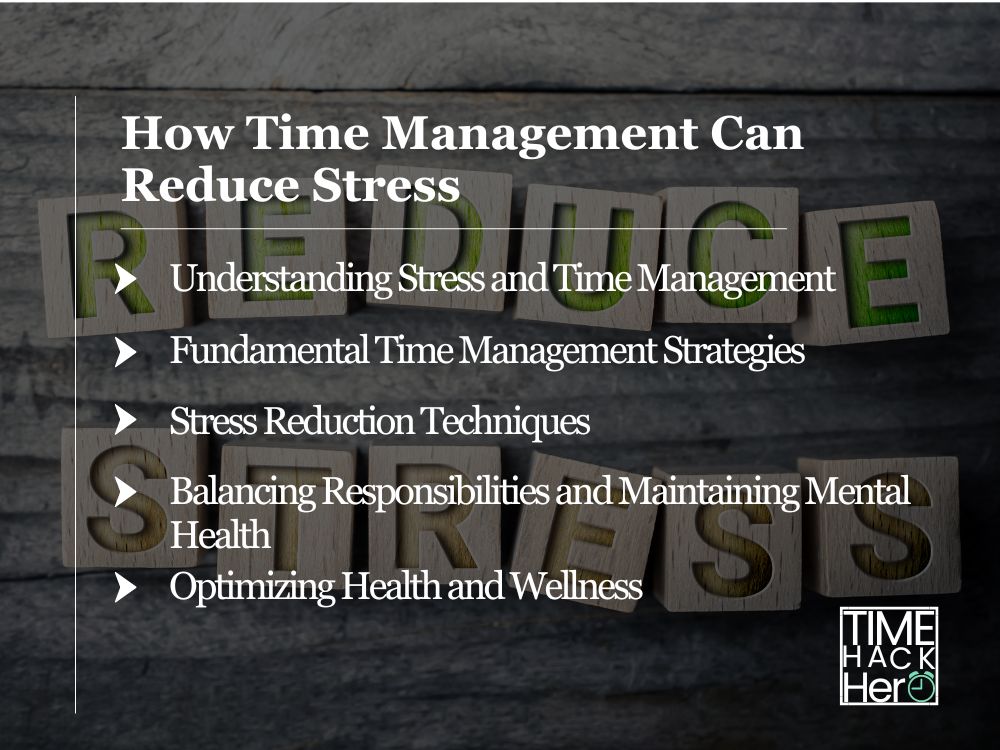In today’s fast-paced world, the importance of effective time management cannot be overstated. Efficiently managing time can lead to numerous benefits, including increased productivity, improved work-life balance, and enhanced overall well-being. One such benefit that often goes overlooked is the role time management plays in reducing stress. By adopting time management strategies, individuals can alleviate the pressure, anxiety, and burnout that often accompany a chaotic lifestyle.
A major contributor to stress is the feeling of being overwhelmed by tasks and responsibilities. When one’s days are filled with countless to-do items, it becomes increasingly difficult to focus and complete tasks in a timely manner. This can lead to a cycle of procrastination, missed deadlines, and ultimately, heightened stress levels. By implementing time management techniques, individuals can gain a clear understanding of their available time and the tasks required of them. This awareness allows for better prioritization, realistic goal setting, and a more balanced approach to daily activities.
Moreover, time management goes beyond merely scheduling and allocating time for tasks; it also involves learning to adapt to unforeseen situations and setting boundaries to maintain a healthy work-life balance. By refining these skills, individuals can experience a greater sense of control over their lives, which in turn, can significantly decrease stress levels. As such, if one seeks to mitigate stress and enhance their overall quality of life, investing in time management strategies can prove to be genuinely transformative.
Table of Contents
Understanding Stress and Time Management
Stress and Its Effects on Mental and Physical Health
Stress is a natural response to challenges or demands in our daily lives. It can affect both our mental and physical health, and when left unchecked, can lead to chronic stress and over time, causing emotional and physical health issues.
- Anxiety and depression are common effects of poorly managed stress.
- Poor work-life balance can exacerbate stress, resulting in decreased productivity and mental well-being.
- Prolonged stress can also negatively impact our physical health, causing sleep disturbances, headaches, and a weakened immune system.
The Importance of Time Management
Effective time management is crucial in mitigating the negative effects of stress on our lives. Here are some benefits:
- Time management allows for better prioritization of tasks, preventing procrastination and ensuring a more efficient use of our energy.
- By organizing and scheduling our day, we can establish a more balanced work-life dynamic, improving our mental health.
- Being efficient with our time means having more time for leisure, socializing, and self-care, which in turn contribute to better overall well-being.
In summary, understanding the relationship between stress and time management is key to improving our mental and physical health. By learning and adopting effective time management strategies, we can reduce stress levels and lead healthier, happier lives.
Fundamental Time Management Strategies
Setting Priorities
One critical aspect of time management is setting priorities. By determining what tasks are most important, you can focus your energy and time on activities that will have the most significant impact. Start by categorizing tasks into groups, such as urgent, important, and less important. This will help you allocate your time and resources efficiently.
- Urgent tasks: Tackle these tasks first, as they require immediate attention.
- Important tasks: Focus on these after completing urgent tasks, as they contribute to your long-term goals.
- Less important tasks: Complete these tasks when you have extra time or as a break from more challenging tasks.
Creating a Schedule
A well-organized schedule is essential for time management. By planning your day ahead, you gain control over your time and reduce the risk of procrastination.
- Begin by listing all the tasks or meetings you need to accomplish for the day.
- Estimate the amount of time each task will take.
- Allocate specific time slots for each task in your calendar.
- Don’t forget to schedule breaks and buffer time for unexpected events.
Organization and Monitoring
Stay organized by using tools that help you manage your to-do list, appointments, and deadlines. Choose tools that suit your needs, whether digital or physical.
- Digital tools: Apps, software, or online calendars can help you keep track of tasks, set reminders, and share your schedule with others.
- Physical tools: Planners, notebooks, or sticky notes can help you stay organized and focused.
Monitoring your progress is also essential. Track your accomplishments and reassess your priorities and schedule as needed. This will ensure that you stay on top of your goals and make adjustments when necessary.
In Summary
By implementing fundamental time management strategies, such as setting priorities, creating a schedule, staying organized, and monitoring progress, you can reduce stress, improve productivity, and achieve long-term success.
Stress Reduction Techniques
Sleep and Rest
Getting enough sleep and rest is essential for reducing stress and preventing burnout. It’s important to establish a regular sleep schedule, create a relaxing bedtime routine, and ensure you’re getting quality sleep. This can include:
- Taking melatonin supplements or using relaxation methods to regulate your body’s circadian rhythm
- Practicing good sleep hygiene, such as limiting screen time before bed, avoiding stimulating activities or caffeine close to bedtime, and creating a sleep-friendly environment
Physical Activity and Exercise
Regular physical activity and exercise can help with stress management by releasing endorphins, improving mood, and promoting relaxation. It’s essential to include a variety of activities to maintain motivation and prevent boredom. Activities to consider are:
- Aerobic exercises, such as running or swimming, that increase heart rate
- Strengthening exercises, like weightlifting or calisthenics, to build muscle and improve bone health
- Flexibility exercises, such as yoga or Pilates, that help stretch muscles and increase range of motion
- Mindful activities like tai chi or qigong to promote relaxation while improving balance and coordination
Relaxation Methods
Incorporating relaxation techniques into your daily routine can help you manage stress and maintain a sense of calm amidst overwhelm. It’s best to experiment with various methods to determine which ones work best for you. Some relaxation methods to consider are:
- Meditation, which involves focusing your attention on one thing- like your breath, a word, or an object- to help calm your mind and reduce stress
- Mindfulness, a practice that emphasizes being present and fully engaged in the current moment without judgment
- Deep breathing exercises, such as diaphragmatic breathing or alternate nostril breathing, can help reduce stress by promoting relaxation and increasing oxygen levels in the system
- Progressive muscle relaxation, a technique that involves tensing and relaxing different muscle groups, can help reduce physical tension brought on by stress.
Incorporating these techniques into daily life can help manage stress by promoting relaxation, facilitating better sleep, and increasing overall well-being.
Balancing Responsibilities and Maintaining Mental Health
Setting Boundaries
Setting boundaries is an important aspect of balancing responsibilities and reducing stress. It is essential to establish clear limits on the amount of work you take on at a given time, especially in relation to your personal life. By doing this, you can prevent burnout and prioritize tasks that align with your values. In practice, setting boundaries can involve saying “no” to additional work or projects if it interferes with your mental health or quality of life.
Seeking Counsel, Therapy, and Support
Regularly seeking counsel, therapy, and support is a proactive step in managing stress and maintaining mental health. Counseling services offer guidance and practical advice on dealing with day-to-day challenges, while therapy focuses on identifying and addressing deep-rooted sources of stress. Engaging in positive self-talk and maintaining a support network can also significantly improve your mental wellbeing.
| Service | Purpose |
|---|---|
| Counseling | Guidance on dealing with daily challenges |
| Therapy | Identifying and addressing sources of stress |
| Support | Engaging in positive self-talk and building a network |
Cultivating a Healthy Work-Life Balance
Achieving a healthy work-life balance is crucial for stress relief and overall mental health. Here are some practices that can help improve work-life balance:
- Prioritize tasks: Focus on tasks that are important and urgent, while also setting aside time for personal matters.
- Adopt healthy habits: Incorporate regular exercise, proper nutrition, and sufficient sleep into your daily routine.
- Embrace positive thinking: Practice reframing negative thoughts as opportunities for growth and learning.
- Delegate tasks: Share responsibilities with others to avoid becoming overwhelmed.
- Unplug from technology: Set aside designated times for personal activities, free from work-related devices or communication.
By incorporating these practices, you can effectively manage stress, reduce the likelihood of burnout, and enjoy a more balanced and fulfilling life.
Optimizing Health and Wellness
Diet and Nutrition
A healthy diet plays a crucial role in reducing stress. When we are busy, there’s a tendency to neglect diet and nutrition, leading to poor choices that make our bodies feel worse. Eating a balanced diet rich in nutrients can help us better manage stress and maintain strong immune systems. It’s essential to consume a variety of fruits, vegetables, whole grains, lean proteins, and healthy fats to strengthen the body’s ability to cope with stress.
Embracing Laughter and Music
Laughter and music are two proven stress reducers.
- Laughter releases endorphins, which are natural substances that contribute to a positive and relaxed state of mind. Engaging in activities that make us laugh can help alleviate stress and increase our overall feeling of well-being.
- Music can be a powerful tool for reducing stress, as it has a direct effect on our emotions. Listening to soothing or uplifting music can help calm nerves, relax the muscles, and promote a more positive outlook.
Coping with Setbacks
Everyone experiences setbacks in life. Learning to cope with them effectively is crucial for stress reduction. Here are a few strategies to deal with setbacks:
- Walking: Aerobic exercises like walking have been shown to reduce stress and its negative effects on the heart. Incorporating regular walks into our daily routines can lower the risk of heart disease and improve overall quality of life.
- Positive attitude: Maintaining a positive attitude helps us better recover from setbacks. Keeping our minds focused on the bigger picture enables us to move forward and continue pursuing our goals.
- Taking breaks: When we feel overwhelmed, it’s essential to take a step back and give ourselves time to recuperate. Taking breaks can help reduce stress levels and prevent burnout.
Reflection
Fostering a habit of reflection can help us identify and mitigate the causes of stress. By setting aside time to reflect, we can better understand our personal triggers, develop strategies for overcoming them, and improve our overall stress management skills. Reflection can be done through journaling, meditation, or discussing our thoughts and feelings with a trusted friend or family member.
Conclusion
In conclusion, effective time management can play a significant role in reducing stress levels. By learning how to prioritize tasks, set realistic goals, and manage daily schedules, individuals can experience a better work-life balance and increased overall well-being.
Some of the specific benefits of effective time management include:
- Improved sleep habits: With proper time management, individuals can allocate enough time for rest and relaxation, which can improve sleep quality and help reduce stress.
- Reduced procrastination: By breaking down tasks into manageable chunks and setting deadlines, individuals can tackle their responsibilities more efficiently and avoid procrastination, which often leads to increased stress.
- Increased productivity: Efficiently managing one’s time can lead to increased productivity, which not only helps reduce stress but also boosts confidence and professional growth.
It is essential to remember that time management is not a one-size-fits-all approach. Individuals must tailor their strategies to fit their unique needs and circumstances. By incorporating effective time management techniques into daily routines, people can successfully navigate the demands of their personal and professional lives, ultimately reducing stress and promoting overall well-being.









